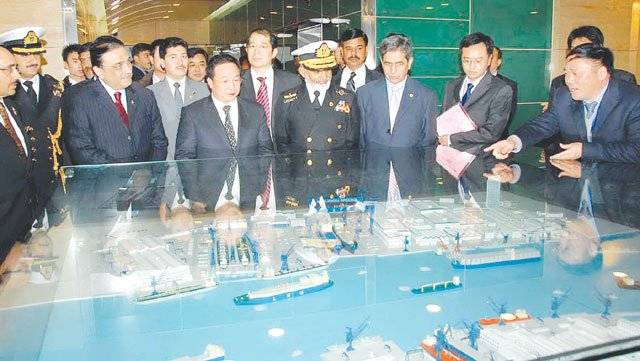SHANGHAI (APP) - President Asif Ali Zardari Monday said that the world including the super powers today were facing challenges from the non-state actors who were bent upon damaging the world peace. Addressing the Shanghai-based think tanks, the President said the emergence of these elements is a new phenomenon as they have nothing to lose but everything to damage. "We are not threatened by nations but by the non-state actors," President Zardari said. Pakistan, he said, has been at the forefront of many international disputes and has managed to survive as a nation. He said Pakistan and China are intertwined as far as security and international politics are concerned and Pakistan has always supported China at all international fora on various issues. Pakistan, he added, will continue to maintain this position as China is a trusted and good friend. "We will always be friends for a better today and a better tomorrow." The President lauded Chinese phenomenal progress in all spheres of life specially science and technology and said nothing succeeds like success. "We bask in your glory and Pakistan and every Pakistani is proud of success of China." He reiterated that the two sides have not been able to take advantage of the bilateral cordial ties, which he wants to take to new heights. Representatives of Shanghai Institute of International Studies, Shanghai Academy of Social Sciences and Fudan University said Pakistan has played a positive role in the fight against terrorism and extremism. They stressed that there should be an increased interaction between teachers, students, educational institutions and think-tanks of the two countries. They said these think-tanks play a major role in guiding the government in framing their policies in various sectors as they do necessary research in their respective fields. Later, talking to Chairman Xinjiang Tianye Water Saving Irrigation System Guo Qingren, who called on the President here at his hotel suite, President Zardari stressed the need for better irrigation methods to conserve water as it was a precious commodity, which must be used judiciously. Zardari was briefed about various irrigation methods in Xinjiang province. Afterwards, Pakistan and China signed two MoUs - one on drip irrigation and the other on cooperation in BT coloured cotton. The MoUs were signed by Dr Zafar Altaf from Pakistani side and Guo Qingren and Director General of Xinjiang Tianye Water Saving Irrigation System Zhang Qi Quang from Chinese side. President Zardari also witnessed the signing ceremony. While addressing the heads of major financial institutions and banks, President Zardari underlined the need for interaction between the financial institutions of Pakistan and China, urging the Chinese investors to benefit from the trade opportunities available in Pakistan. The President said the government would provide maximum support to the Chinese investors to establish an enhanced economic link between the two countries. He said the opening of branches by China's leading banks in Pakistan, would further expand the domain of financial interaction between the two countries. He said Pakistan is willing to enhance the existing multi-dimensional relations with China, and wants to initiate railway links as well in addition to the existing road and sea links. He mentioned Pakistan's seaports that made a shorter links for China as compared to other ports of Shanghai and Hong Kong, and said it can provide China an opportunity to access the Gulf markets. He recalled his words in October last year to visit China after every three months, which he said aimed at benefiting from the industrial advancement of China. The President said Pakistan provided opportunities for investment in diverse sectors, and asked the financial institutions and banks of China to expand their networks to Pakistan and other countries of Asia for the interest of other nations as well. He said in the past, the relationship could not be much used for the advantage of people, however time has come to expand these ties and shape them into economic-based cooperation.
Friday, April 19, 2024
Extremists threat to world peace: Asif

President calls for meaningful dialogue to end polarisation
April 19, 2024
KP minister briefed on issues about sales tax on services
April 19, 2024
64th anniversary of freedom fighter Mirzali Khan marked
April 19, 2024
893,000 students appear in SSC exams in KP
April 19, 2024
Hepatitis Challenge
April 18, 2024
IMF Predictions
April 18, 2024
Wheat War
April 18, 2024
Rail Revival
April 17, 2024
Addressing Climate Change
April 17, 2024
Justice denied
April 18, 2024
AI dilemmas unveiled
April 18, 2024
Tax tangle
April 18, 2024
Workforce inequality
April 17, 2024
New partnerships
April 17, 2024
ePaper - Nawaiwaqt
Advertisement
Nawaiwaqt Group | Copyright © 2024





